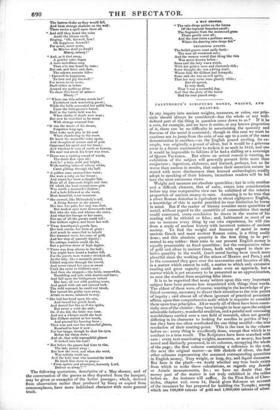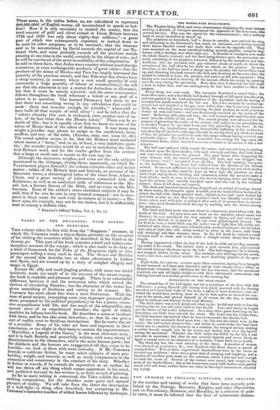PALETHORPE'S SCRIPTURE MONEY, WEIGHT, A/4D MEASURE.
IN any inquiry into ancient weights, measures, or coins, one prin- ciple should always be considered—has the whole or any well- defined part of the thing in question come down to us ? If it be a coin, for example, and we have it entire, or any known proportion of it, there can be no difficulty in ascertaining the quantity and fineness of the metal it contained ; though in this case we must be cautious not to jump from the coin of one age to a coin of the same denomination in another,—as the English pound sterling, for ex- ample, was originally a pound of silver, but it would be a grievous error in a future numismatist to reckon it as such in 1842, and one it would be impossible to fall into if he had a shilling or a sovereign of Queen VICTORIA. But where an actual remain is wanting, an exhibition of the subject will generally present little more than conjecture ; ingenious, elaborate, and learned, perhaps, but so far worse than useless in results, that unless their uncertain nature be stated with more distinctness than learned archmologists readily adopt in speaking of their labours, incautious readers will be led into the most erroneous views.
Weight and measure are absolute quantities; but in coin another and a difficult element, that of value, enters into consideration before any true comparative view can be exhibited of the relative proportion of ancient money to ours. Assuming it to be true that a silver Roman denarius is equivalent to about eightpence English, a knowledge of this is useful provided its true limitation be bornp in mind. But if the reader of history consider mere quantities of metal, without regard to the quantities of commodities that metal could command, every conclusion he draws in the course of his reading will be vitiated or false ; and, habitnated as most of us are to measure every thing by our Own experience, he will rise from a study of ancient history with incorrect notions of ancient society. To find the weight and fineness of metal in many ancient Greek and most ancient Roman coins, is a thing easily done ; and this absolute quantity is the first thing to be pre- sented in any tables: their ratio to our present English money is equally presentable as fixed quantities : but the comparative value of gold and silver in ancient times, both with regard to their re- lative quantity in the world, (each metal having been much more plentiful since the working of the mines of Mexico and Peru,) and to the command they gave over the necessaries and luxuries of life, is a matter which cannot be told, a matter to which only extensive reading and great sagacity could make even an approach, but a matter which is yet necessary to be presented as an approximation, to save the student from acquiring false ideas.
It is to be regretted that many writers upon this very important subject have been persons less acquainted with things than words. The eldest of them were, of course, wanting in the knowledge of po- litical economy, necessary to direct their attention to the true points of inquiry ; and almost all of them ignorant of practical pecuniary affairs, upon that comprehensive scale which is requisite to consider them upon true principles. All or nearly all of them have been essen- tially men of the cloister : they have brought to bear upon the subject admirable industry, wonderful erudition, and a painful and unceasing watchfulness carried over a vast field of research, often not greatly differing in its character to looking for needles in potties of hay : but they have too often overlooked the one thing needful—the true resolution of their starting-point. This is the case in the volume before us : every thing is excellently done' except that which is to conduct to a true result. The Scriptures have been searched with care : every text mentioning weights, measures, or money, has been noted and distinctly presented, in six columns, occupying the whole of the page; the first column containing a reference to the text, the next the original matter—as 600 shekels of silver, the four other columns representing the assumed corresponding quantities
in English money, Troy weight, or long, dry, and liquid measures. But here is the pinch—we doubt whether any true basis exists from which to make these calculations as regards any Jewish or Asiatic measurements, &c.; we have no doubt that the money part of the matter is not truly exhibited in the tables before us. An instance will suffice. In the First Book of Chro- nicles, chapter xxii. verse 14, David gives Solomon an account of the treasures he has prepared for building the Temple; among which are 100,000 talents of gold and 1,000,000 talents of silver.
These sums, in the tables before us, are calculated to represent 888,000,0001. of English money, all accumulated in specie or bul- lion! Now it is only necessary to remind the reader, that the total amount of gold and silver coined in Great Britain between 1790 and 1833 was only about eighty-four millions,"—a great part of which was subsequently exported, or melted down to be used for other purposes, or to be recoined; that the treasure said to be accumulated by David exceeds the capital of our Na- tional Debt, and most probably exceeds all the precious metals existing at one time in the world, certainly in the shape of coin ; and be will be convinced of the utter incredibility of the computation. If be add to these facts, that Judea was a country without much foreign commerce, or even exchangeable products of great value— that the produce of the mines of Mexico and Peru has largely increased the quantity of the precious metals, and that Palestine has always been a cheap country, (a country where a very small quantity of coin commands a large quantity of labour or commodities,)—he will see that the statement is not a matter for deduction or allowance, but that it must be utterly rejected : and the same consequence follows throughout the book wherever a talent or any part of a talent is in question. The learned PRIDEAUX had sense to see that there was something wrong in any calculation that could be made : there was treasure enough, be remarks," wherewith to have built all that temple of solid silver "; and he infers that the "talents whereby this sum is reckoned, were another sort of ta- lent, of far less value than the Mosaic talent." There can be no doubt of this ; but it is equally clear that we know no more of the talent of Moses than of the talent of Solomon. It may mean any weight a jeweller may please to assign to the candlestick, lamp, snuffers, and tray of the table, (Exodus, chap. xxv. verse 31, 39.) The sound opinion seems to be, that the Hebrew word rendered talent means a " lump," and, to us, at least, a very indefinite quan- tity: the sounder practice would be to use in translation the iden- tical Hebrew word, and let the reader gather from the centext that a large or small sum is meant as the case may be.
Although the measures, weights, and coins are the only subjects mentioned in the titlepage, (being those, apparently, on which Mr. PALETHORPE piques himself,) the volume contains other and better matter : tables of the Hebrew fasts and festivals, an account of the Masoretic notes, a chronological index of the times from Adam to Christ, and a great variety of information connected with the Scriptures, as well as an analytical table of references to the Mo- saic law, a literary history of the Bible, and an essay on the Mil- lennium. Even of the author's more cherished subjects it may be said, that if he errs he errs in very learned company : nor in mea- sures is there room for such wide deviations as in money—a He- brew span, for example, may not be ten inches, but it is sufficiently near to convey a definite idea.
* PORTER'S Official Tables, Vol. I., No. 15.

























 Previous page
Previous page